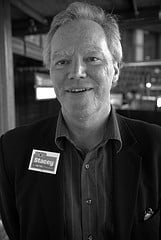The election results were full of surprises last night. There are three races in particular I want to share some of my thoughts on today: Metro President, Portland City Council, and Washington County Chair.
The biggest story (at least from my perspective) is that Rex Burkholder, a co-founder of the Bicycle Transportation Alliance and major advocate for bicycling and active transportation, finished third in the race for Metro President and will not be in a run-off for that position.
Burkholder ended up with just 28% of the vote, far behind the other two men in the race. Former Mayor of Hillsboro Tom Hughes won the election with 37% of the votes, just over 4,000 more than Bob Stacey.
Hughes ran a campaign touting his experience at job creation, even though Metro — which governs 25 cities in the region — deals more with land-use and transportation policy than job-growth. On those fronts, Stacey and Burkholder clearly had more credentials.
Burkholder’s history in bike advocacy is well-known and as a current Metro Councilor he serves on a number of transportation-related committees and boards. Stacey is a veteran of city and state politics and a former leader of non-profit land-use and planning advocacy group 1000 Friends of Oregon.
For many voters (as this Portland Mercury article detailed), the Stacey-Burkholder decision was based on their positions on the controversial Columbia River Crossing Project. Burkholder supports it and Stacey doesn’t.
For people who are opposed to the CRC project, Stacey’s success at the ballot box is cause for optimism (and likely gave them a boost of energy at today’s protest). Or, as a commenter put it last night, “Electing Bob Stacey is critical in ending this 12 lane CRC nightmare.”
Burkholder’s drift into the political center — illustrated most sharply by his CRC stance — is likely what contributed to his poor showing. To the voters in the region on the political right, he was known as the classic progressive supporter of bicycling — while his CRC stance turned much of his base against him. Burkholder had 7,600 fewer votes than Stacey in Multnomah County (which includes Portland and six other small cities) and 3,100 fewer votes in Washington County (which includes Hillsboro, Beaverton, Tigard and Forest Grove).
Interestingly, Burkholder enjoyed strong support from well-known, veteran Portland bike advocates like Bike Gallery owner Jay Graves, lawyer Ray Thomas, and former PBOT bike program manager and CEO of Alta Planning Mia Birk. This race further validates to me that there’s a new generation of activists in Portland who are not satisfied with the status-quo and incremental rate-of-change toward a less-motorized future that we’re currently experiencing in Portland.
The race between Hughes and Stacey will be very interesting to watch. The two bring very different perspectives on the future of our region’s growth. (I sat down with Stacey for an interview a few weeks ago and look forward to sharing more about his thoughts on bicycling, the CRC, and other topics very soon.)
In the race for Portland City Council Position No. 2, incumbent Dan Saltzman avoided a run-off by getting over 54,000 votes (or 55%) according to the latest counts. The surprise storyline of the night wasn’t only that none of his contenders made a serious run (Mary Volm was second with just 12%), but that publicly-funded candidate Jesse Cornett had an abysmal showing.
Despite being the only candidate in this race to qualify for $150,000 of public funding to run his campaign, Cornett got only 8% of the vote. Some local pundits think his performance might mean the end of Portland’s voter-owned elections.
Voter-owned elections might be in trouble, but it wasn’t entirely a lack of funds that hurt Cornett.
I interviewed Cornett back in January and he was definitely the most bike-savvy guy in the race. However, during his campaign he jumped on the “We shouldn’t use sewer money for bike lanes” bandwagon. Mayor Adams’ plan was (admittedly) handled terribly from a PR-standpoint, but the “sewer money for bike lanes” line is nothing more than a catchy soundbite that doesn’t accurately represent the concept (for starters, the money cannot be used for bike lanes and some bike-related/traffic calming infrastructure is quite complementary with stormwater management — a key function of our sewer dollars).
It was almost as if Cornett had the funding structure of a grassroots candidate but a campaign that tried to be a bit too slick and professional. Saltzman is about as professional as politicians get. To give him a serious run, Cornett needed to play the crusader, not the politician-in-training.
The other race that interested me was for Washington County Chair. Major active transportation advocate Dick Schouten came up short against Andy Duyck, garnering 39% of the votes to Duyck’s 54%. Schouten would have been a force for biking and walking improvements on the West side. To give you a sense of how that race was framed for voters, here’s a snip from the Beaverton Valley Times from back in January:
“Duyck, a Republican, is known for his straight talk and ties to the county’s agricultural community. Schouten, a Democrat, is a brainy planning advocate more often than not seen riding his bicycle through the county.”
Schouten is far from out of the picture. He noted in an email to supporters today that he’ll remain dedicated to his principles as a member of the Washington County Board of Commissioners.
I plan on doing more coverage of the general election in the months to come. Stay tuned for an article from my interview with Bob Stacey. I also plan to meet Tom Hughes as well as our two candidates for governor, John Kitzhaber and Chris Dudley.


